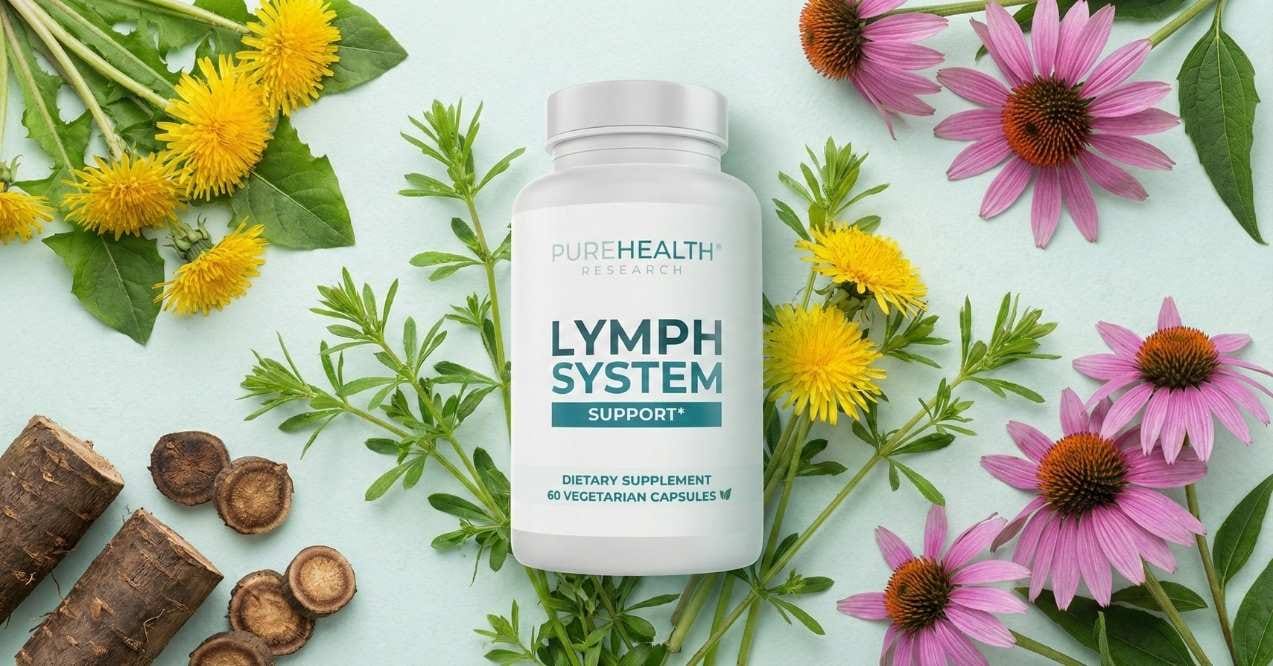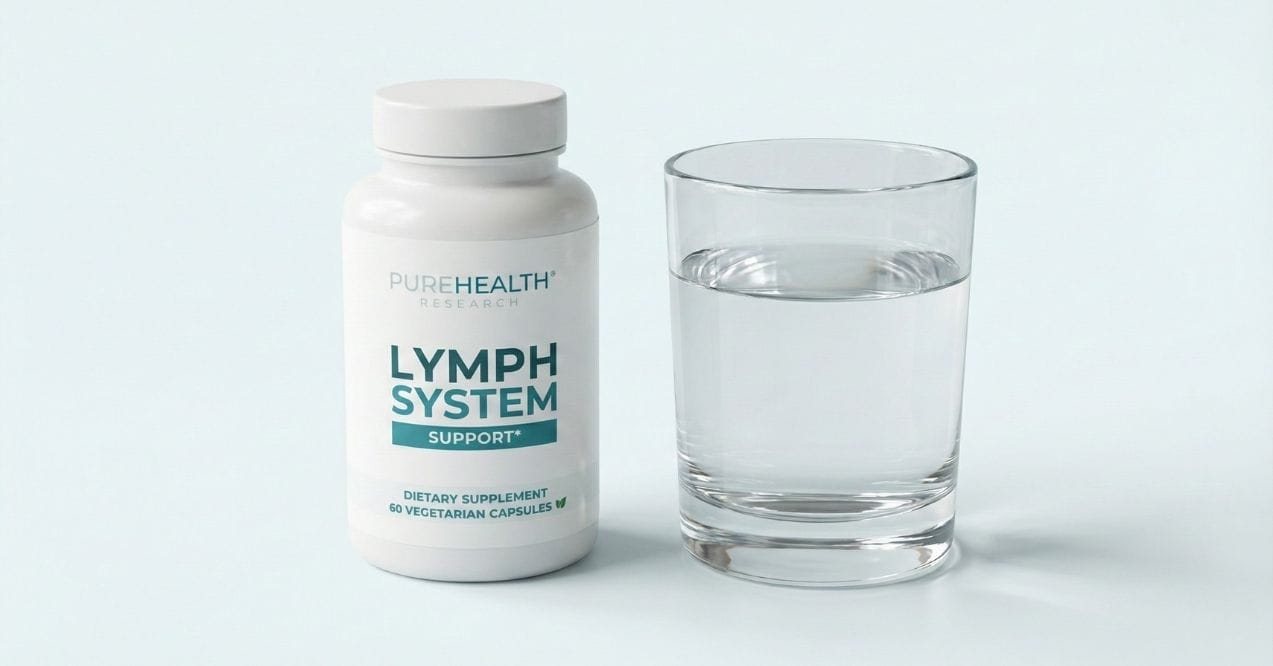10 Foods That Are Good for the Lymphatic System
Discover 10 powerful foods good for lymphatic system health. Support natural detoxification and immune function with these easy dietary additions.


Your lymphatic system not only helps maintain proper fluid balance but also plays a crucial role in supporting your immune defenses against everyday challenges.
What many people don’t realize is that simple dietary choices can significantly influence how efficiently this system functions. The foods you choose can either support or hinder your lymphatic health. In this article, we’ll explore ten foods good for lymphatic system function that can help maintain this vital network.
The Role of Nutrients in Lymphatic Health
Certain nutrients may help support overall lymphatic function. Some of those include vitamin C, chlorophyll, omega fatty acids.
Vitamin C, abundant in citrus fruits, is a key player in lymphatic health. It supports collagen production, which helps maintain the strength and integrity of lymphatic vessels. This allows lymph fluid to move more efficiently throughout your body, supporting natural cleansing processes.
Chlorophyll-rich foods like leafy greens provide another layer of support. This plant pigment assists in:
- Neutralizing unwanted compounds in the body
- Supporting the body’s natural detoxification processes
- Promoting overall cellular health
Omega-3 fatty acids found in nuts and seeds may also contribute to vascular health. These beneficial fats help maintain the flexibility and function of vessels, supporting healthy circulation throughout the lymphatic network.
For those looking to complement these natural approaches, lymph system supplements can provide additional support in maintaining lymphatic wellness. These supplements work alongside your healthy lifestyle habits to support optimal lymph fluid flow and reduce temporary fluid retention.

Each supplement works synergistically to help maintain optimal lymphatic flow and function, especially beneficial for adults looking to support their body’s natural cleansing processes.
10 Foods That Support the Lymphatic System
The right foods can play a critical role in supporting fluid circulation, detoxification, and immune function. By incorporating foods good for lymphatic system health into your daily meals, you can help maintain this vital network. Let’s explore the top foods to improve lymphatic drainage and overall lymphatic function.
1. Water

Pure, filtered water stands as the foundation of lymphatic health. As a primary component of lymph fluid, adequate hydration ensures this system can effectively transport waste away from tissues and maintain proper flow.
Try to drink at least 6-8 glasses throughout your day, especially between meals. For added benefits, consider:
- Adding fresh lemon slices for flavor and gentle cleansing support
- Enjoying herbal teas like dandelion or nettle to enhance hydration
- Keeping a water bottle nearby as a visual reminder to sip regularly
2. Leafy Greens
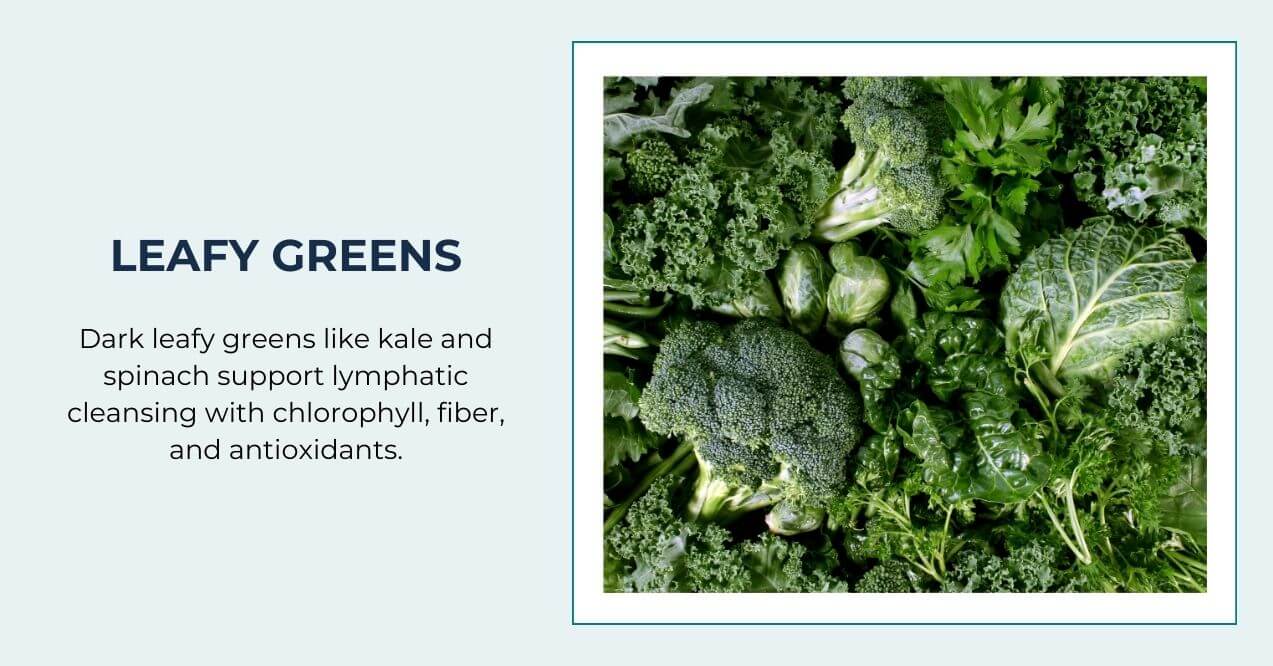
Dark leafy greens like kale, spinach, and Swiss chard rank among the most powerful foods for lymphatic health. These nutritional powerhouses contain chlorophyll, which helps neutralize unwanted compounds and supports gentle lymphatic cleansing.
Their rich fiber content assists with elimination, while their antioxidants protect cells throughout the lymphatic network. Many herbs for lymphatic system support, such as parsley and cilantro, also fall into this category and can be easily incorporated into meals.
Try adding a handful of greens to:
- Morning smoothies
- Lunch salads
- Lightly steamed side dishes
- Savory soups
3. Citrus Fruits
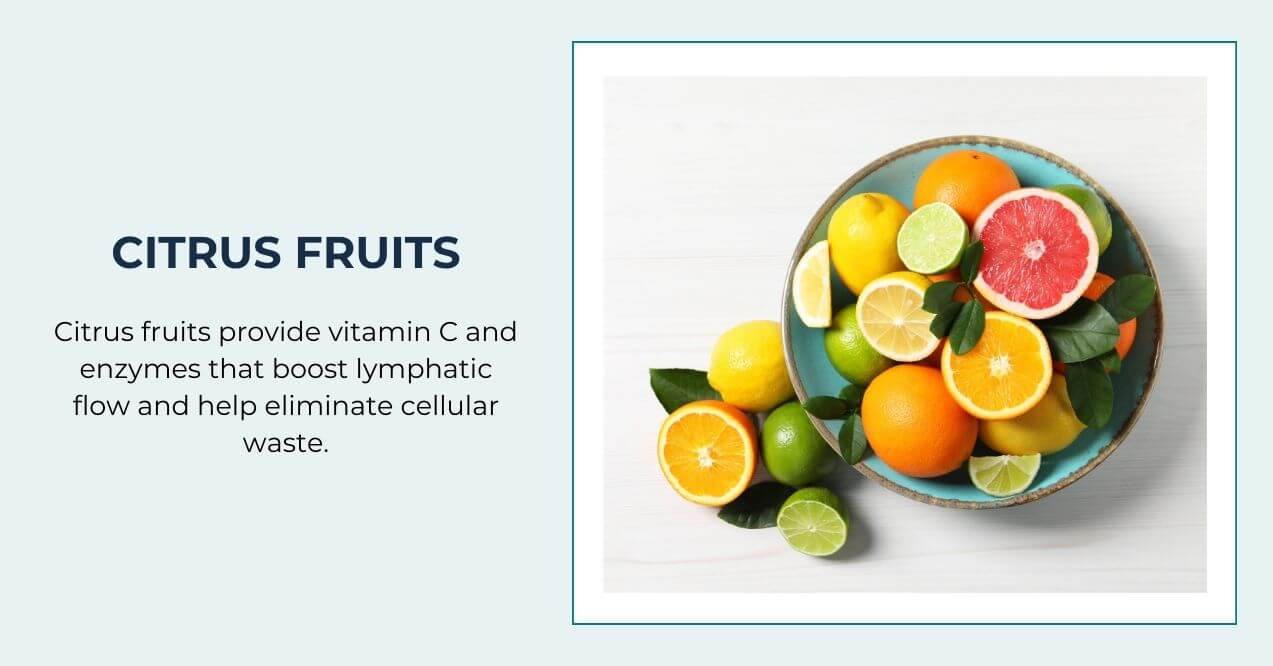
Oranges, grapefruits, lemons, and limes provide abundant vitamin C, which strengthens the collagen in lymphatic vessels. These fruits contain enzymes that promote lymphatic movement and support optimal hydration levels.
The natural acidity in citrus helps break down cellular waste products for easier removal through the lymphatic system. Enjoy citrus by:
- Squeezing fresh lemon into your morning water
- Adding orange segments to salads
- Enjoying a small glass of freshly squeezed juice with breakfast
- Using citrus zest in cooking for flavor and benefits
4. Berries

Colorful berries like blueberries, strawberries, raspberries, and cranberries contain powerful antioxidants that support a healthy inflammatory response throughout the body, including the lymphatic system.
These small fruits pack a substantial nutritional punch, helping reduce oxidative stress that can impair lymph function. Their fiber content also supports elimination. Incorporate berries by:
- Topping morning oatmeal or yogurt
- Blending into smoothies
- Enjoying as a refreshing snack
- Adding to salads for a sweet contrast
5. Nuts and Seeds
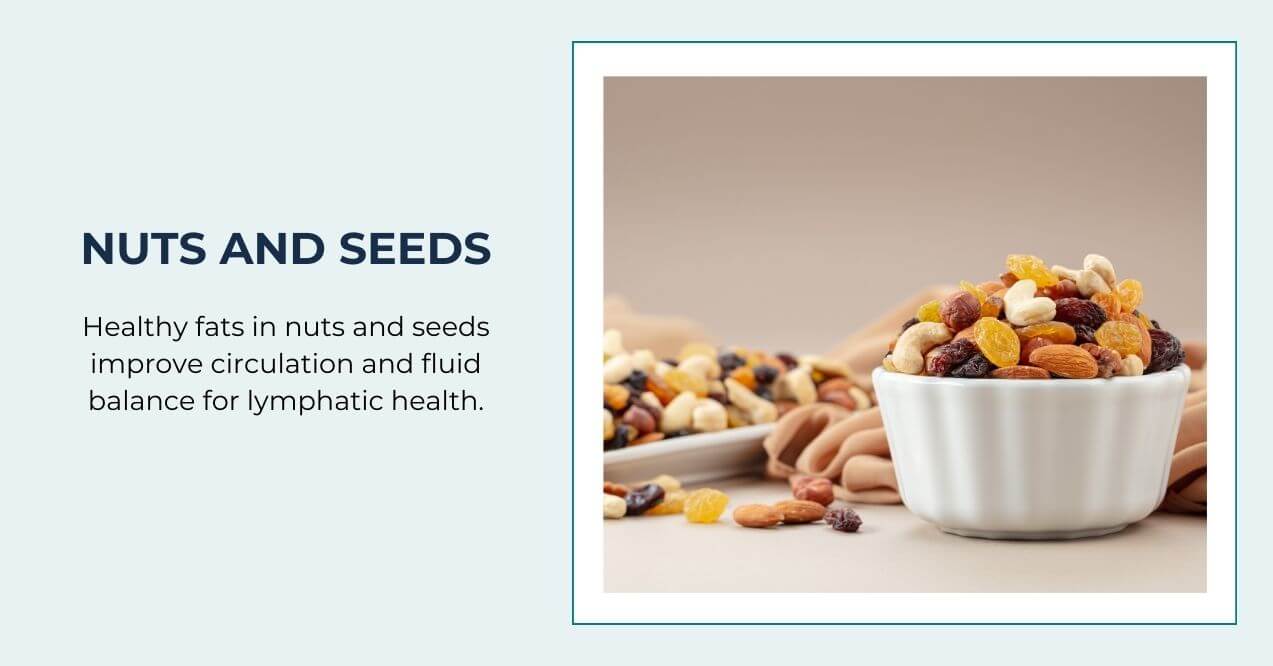
Almonds, walnuts, chia seeds, and flaxseeds provide healthy fats that support circulation and lymphatic health. These nutrient-dense foods contain omega-3 fatty acids that contribute to vascular health and proper fluid balance.
Their protein and mineral content further supports the structural integrity of the lymphatic system. Add these to your diet by:
- Sprinkling ground flaxseed on cereal or yogurt
- Enjoying a small handful of raw almonds as a snack
- Adding walnuts to salads
- Using chia seeds in puddings or smoothies
6. Garlic

This aromatic bulb contains natural detoxifying properties that encourage circulation and lymphatic function. Garlic’s sulfur compounds support the body’s natural cleansing processes and help maintain healthy lymph flow.
For maximum benefits, crush or chop garlic and let it sit for 10-15 minutes before using. Incorporate it by:
- Adding to soups and stews
- Including in homemade salad dressings
- Using in stir-fries with plenty of vegetables
- Roasting whole bulbs for a milder, sweeter flavor
7. Turmeric

The golden spice turmeric contains curcumin, which helps maintain healthy lymphatic circulation. This powerful compound supports a balanced inflammatory response and assists the body’s natural detoxification processes.
Since curcumin is better absorbed with black pepper and healthy fats, consider these combinations when cooking. Enjoy turmeric by:
- Adding to warm milk with honey for a comforting golden milk
- Incorporating into soups and stews
- Sprinkling on roasted vegetables
- Using in curry dishes with coconut milk
8. Seaweed

Various forms of seaweed like kelp, nori, and wakame provide minerals that support fluid balance and the body’s natural elimination processes. Their iodine content helps regulate metabolism, which affects how efficiently your lymphatic system functions.
Seaweed also contains unique compounds that can help remove excess fluids. Try incorporating seaweed by:
- Adding strips to soups
- Enjoying nori-wrapped sushi rolls
- Sprinkling seaweed flakes on salads
- Using kelp noodles in stir-fries
9. Ginger

Fresh ginger root supports circulation and lymphatic flow while also aiding digestion. Its warming properties gently stimulate detoxification pathways and encourage lymph movement.
Regular consumption of ginger can help maintain the vital flow of lymph fluid throughout your body. Include ginger by:
- Brewing fresh ginger tea
- Adding grated ginger to stir-fries
- Incorporating into smoothies
- Using in homemade salad dressings
10. Cruciferous Vegetables
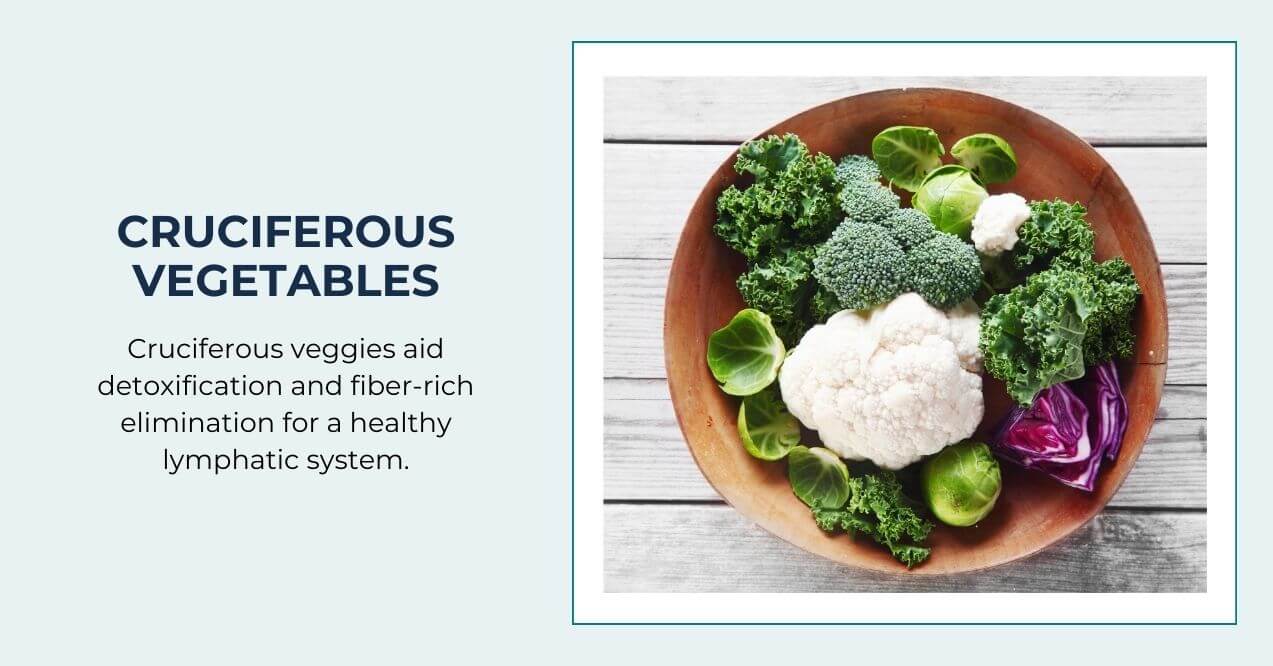
Broccoli, cabbage, Brussels sprouts, and cauliflower contain glucosinolates, which aid in detoxification and help clear waste from the lymphatic system. These compounds support enzyme production that assists in breaking down potential toxins.
These vegetables also provide fiber for elimination and nutrients that support cellular health. Enjoy cruciferous vegetables by:
- Lightly steaming to preserve nutrients
- Roasting with olive oil for a flavor boost
- Adding to stir-fries
- Incorporating into soups and stews
While focusing on these beneficial foods, be aware of the worst foods for lymphatic system health, which include processed items, excessive sugar, and artificial ingredients that can create additional work for your lymphatic network.
Other Ways to Support Your Lymphatic System
While nutrition forms the foundation of lymphatic health, a comprehensive approach includes several other supportive practices. Your lymphatic system doesn’t have a pump like your heart – it relies on your body’s movements and breathing to keep fluid flowing properly. Here are additional strategies to maintain optimal lymphatic function:
- Stay Active – Unlike blood, lymph fluid doesn’t have its own pump and relies on physical movement. Regular activities like walking, gentle yoga, or swimming help compress lymph vessels, encouraging flow.
- Practice Deep Breathing – Diaphragmatic breathing creates a gentle pressure that helps lymph fluid move through your chest and abdomen.
- Try Dry Brushing – This simple technique involves using a natural-bristle brush to gently stroke your skin toward your heart. This light stimulation can support surface circulation and lymphatic flow.
- Reduce Processed Foods – Highly processed items containing artificial ingredients can create additional work for your lymphatic system. Focusing on whole, natural foods allows your body to maintain efficient lymphatic function.
- Stay Properly Hydrated – Beyond drinking water, ensure consistent hydration throughout the day. This keeps lymph fluid flowing optimally and supports waste removal.
Many people wonder why does the lymph nodes swell in certain situations. This typically represents your body’s normal response to potential threats – the nodes act as filtering stations that can temporarily enlarge while performing their protective function. Similarly, enlarged preauricular lymph nodes (located just in front of the ears) often respond to issues affecting nearby areas like the eyes, scalp, or ears.
By combining these lifestyle practices with lymphatic-supporting foods, you create an environment where this vital system can perform at its best, supporting your overall wellness.
Conclusion
Supporting lymphatic health through mindful eating, proper hydration, and active living creates a foundation for whole-body wellness. Incorporating these 10 foods good for lymphatic system function provides your body with essential nutrients needed for optimal cleansing and immune support. By making small, consistent choices daily, you’re investing in your long-term wellness and vitality.
Water, leafy greens, citrus fruits, berries, nuts, seeds, garlic, turmeric, seaweed, ginger, and cruciferous vegetables support lymphatic health by providing essential nutrients that promote circulation, reduce inflammation, and assist with natural detoxification processes.
Pure water with lemon, herbal teas (especially red clover, echinacea, and cleavers), fresh vegetable juices, and ginger tea can support lymphatic drainage by promoting hydration, circulation, and gentle detoxification.
Stay properly hydrated, eat lymph-supporting foods, exercise regularly, practice deep breathing, try dry brushing, reduce processed food intake, manage stress, and consider supportive supplements like echinacea or rutin.
Increase water intake, incorporate movement daily, try lymphatic massage or dry brushing, practice deep breathing exercises, eat anti-inflammatory foods, and reduce consumption of processed items that may contribute to congestion.
Sign up for our Healthy Living newsletter!
Advertisement. This site offers health, wellness, fitness and nutritional information and is designed for educational purposes only. You should not rely on this information as a substitute for, nor does it replace, professional medical advice, diagnosis, or treatment. If you have any concerns or questions about your health, you should always consult with a physician or other health-care professional. Do not disregard, avoid or delay obtaining medical or health related advice from your health-care professional because of something you may have read on this site. The use of any information provided on this site is solely at your own risk.



